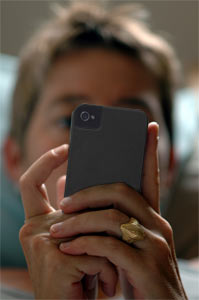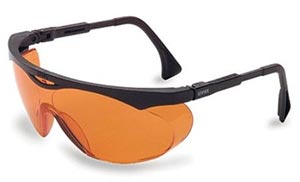Do you avoid being exposed to blue light before bedtime? Whether it’s our smartphone, our tablet, or our laptop, many of us find ourselves curled up with an electronic device come bedtime. However, it turns out that this habit may have unforeseen health consequences. Let’s look at some factors to consider when deciding whether we should be avoiding blue light at night.
Sleep Patterns
 i
i
© Karenwinton | Dreamstime Stock PhotosWhile reading a book before bed always puts me right to sleep, watching a TV show or aimlessly surfing the Internet before bed always keeps me awake longer than I plan. Research shows that this phenomenon is true for most people. In 1981, Dr. Charles Czeisler of Harvard Medical School conducted a study showing that daylight keeps a person’s internal clock in line with the environment.1 This internal clock drives a person’s circadian rhythm, which is physical, mental, and behavioral changes that follow a 24-hour cycle. The suprachiasmatic nucleus (SCN), which controls an individual’s circadian rhythm, is a group of approximately 20,000 nerve cells in the hypothalamus section of the human brain. The hypothalamus is located where the optic nerves from the eyes cross.2
While circadian rhythms are partly influenced by genetics, they are also affected by environmental factors, primarily light. In addition to controlling hormone release and body temperature, circadian rhythms dictate a person’s sleep-wake patterns. The SCN receives information from the optic nerves about the amount of incoming light and then signals to the pineal gland how much melatonin, (the hormone that makes you sleepy) to produce that will match the amount of light in the environment. For instance, at night, when there is less light, the SCN signals to the pineal gland to produce more melatonin.3
Health Impacts
It is easy to see how the bright screens on electronics could disrupt the natural relationship between environmental light and our circadian rhythms. While exposure to any type of light at night suppresses the production of melatonin, blue light is especially powerful in doing so. Harvard University researchers found, for instance, that 6.5 hours of exposure to blue light when compared to traditional home lighting suppressed melatonin production for twice as long and shifted circadian rhythms by twice as much.4
Why are we humans so sensitive to blue light? There are three types of sensors in our eyes. There are rods, which are used for night, motion, and peripheral vision. There are cones, which are used to detect colors. And, there are intrinsically photosensitive retinal ganglion cells (also known as ipRGCs), which are in charge of sending light information to the brain. This third sensor was not even discovered until 2002, and it turns out that it is most sensitive to blue light.5
Unfortunately, disrupted circadian rhythms and low melatonin levels have been linked to breast cancer, prostate cancer, diabetes, heart disease, and obesity. Stephen Lockley, a Harvard University sleep researcher, also adds that not enough sleep can increase the risk of depression.6
What Can You Do?
There are a few lifestyle changes that can decrease your exposure to blue light and keep your circadian rhythm in sync. First, while LED lights are more energy-efficient, they also produce more blue light than traditional incandescent light bulbs. However, the coatings inside of LED bulbs can be changed so that they emit a less blue light. You can also use red-coated light bulbs at night as red light has the least effect on suppressing melatonin.7 Second, expose yourself to a good amount of bright light during the day, which will lead to being more alert during the day and sleepier at night.8
Third, avoid looking at blue screens starting two to three hours before bed. If that isn’t possible, download F.lux, which is a free application that automatically warms the colors on your screen at night. At sunrise, your screen will return to its normal appearance.9 I have been using F.lux for the past few months and have definitely noticed that I am able to fall asleep faster since using it.
Fourth, put some distance between you and your blue screen at night. Mariana Figuerio, a sleep researcher from Renesselaer Polytechnic Institute, explained, “The amount of light you need [in order] to see is lower than the amount of light you need to affect your melatonin.” So, if you’re watching a TV show on your laptop at night, turn down the brightness setting and place the laptop further away from your face than normal.10
 iiLastly, you can wear blue light-blocking glasses at night while you use your electronics. This method is also useful for those that work the night shift at their job, because blocking blue light will help keep their circadian rhythm intact. There are many inexpensive options for orange-tinted glasses; however, these types will block other colors as well, which is not suitable for those using the glasses during night shifts at work. Glasses that block only blue light can cost up to $80.11
iiLastly, you can wear blue light-blocking glasses at night while you use your electronics. This method is also useful for those that work the night shift at their job, because blocking blue light will help keep their circadian rhythm intact. There are many inexpensive options for orange-tinted glasses; however, these types will block other colors as well, which is not suitable for those using the glasses during night shifts at work. Glasses that block only blue light can cost up to $80.11
Good luck getting some good Z’s!




